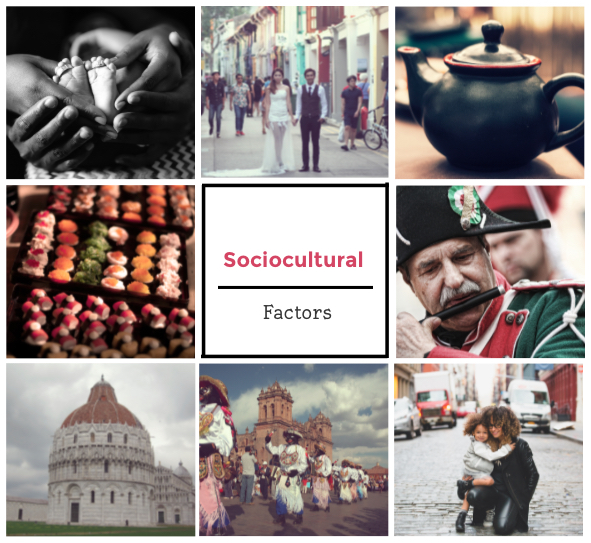The sociocultural factors that affect health relate to society (socio) and culture (cultural). Within society and culture, the syllabus list five (5) sociocultural factors that determine health.
Family
 Family is by far the greatest influence on health from the sociocultural factors. Family will determine your culture and often have a huge impact on your choice of religion, friends and may even decide what and how much media exposure you have (particularly at a young age).
Family is by far the greatest influence on health from the sociocultural factors. Family will determine your culture and often have a huge impact on your choice of religion, friends and may even decide what and how much media exposure you have (particularly at a young age).
Your family are your most intimate relationships and have a huge influence on your attitude towards health, the value you place on health, and influence your behaviour choices relating to protective and risk behaviours. For example, if you grew up in a house where your parents eat fast food frequently (say 3 times a week) you are more likely to think this is normal and even if you know it is not healthy, you re more likely to eat it, because this is what your family are eating. You may also think that cutting back on eating this sort of food, means only eating it once a week, rather than 3 times a week.
Conversely, if your family are health practitioners, such as a nutritionist and an exercise sport scientist, then you are more likely to prioritise healthy eating and exercise. However, you may have an overemphasis on physical health and neglect the other dimensions of health.
Peers
Peer pressure is often the first thing that people think about when it comes to peer influences, however, there is little evidence to say that you are more likely to smoke because your friends tell you to. Instead, your peers influence you by creating environments where you seek to fit into the group by adapting their behaviours. This can be positive, if your group have lots of protective behaviours that they engage in, or negative, if the behaviours increase risk.
This pressure to fit into your peer groups is most sharply felt during adolescence. During the teenage year, many young people select behaviours that place them within a particular peer group that they wish to belong to. This may be developing sporting skills to fit in to the group that love sport, or picking up binge drinking if your peers regularly participate in such activities on the weekend.
Media
The media is another of the sociocultural factors that determine health. The media plays a large role in shaping health. This can be done through marketing campaigns such as “Quit”, “Coco-pops”, or McDonalds advertising. It can be direct through news articles that focus on pink ribbon day or TV shows such as “The Biggest Loser”.
However, most of the influence from the media is not so obvious. It is done through regular shows and subtle phrases that promote particular aspects. When a series shows the cool kids smoking, or drinking, or engaging in sexual activity, it makes the viewer start to think that these are behaviours associated with those particular groups. People then begin to seek to live out the character displayed on their screens.
For example, many of our current images used in advertising depict women in sexually seductive or available poses. These are chosen deliberately to get your attention in order to advertise their products, but it also communicates that women are objects to be used sexually and exploited in such ways. The rise in sexual images and videos that are considered normal today cannot be underestimated. What you now see on billboards advertising perfume used to be centre page fold out posters in pornography magazines. Our society is becoming increasingly desensitised to these graphic images leading to increases in sexual assault, harassment, and higher risk sexual activity at younger ages. As we start to think that these things are normal, we begin to act on it which leads to risk behaviours.
Religion
Your religion is another of the sociocultural factors that influence your health. This can often be in a positive manner, providing a purpose for life and promoting self worth. Given that Spirituality is an entire dimension of health, it is no surprise that your religion will influence your health. Often regions also have rules, such as not getting drunk, no sex before marriage, that promote protective behaviours in individuals and promote health.
However, religion can also be limiting. Some regions place restrictions on clothes and social interactions, which can have negative effects on the health of the individual. For example, a monk who takes a vow of silence and lives in isolation will lack social interaction. Other religions limit the social interaction between sexes or prevent contact between those belonging to the religion and “outsiders”.
Religion can also limit your choices in relation to health care. For example, the Jehovah’s Witnesses will refuse a blood transfusion as it is against their beliefs.
Culture
The last of the sociocultural factors mentioned in the syllabus is culture. Culture is all the traditions, values, and a number of other behaviours, including traditional foods or social activities. Culture is passed down by the immediate and wider family. A sense of connection and belonging to your culture can have a positive influence on health, especially improving the social dimension of health.
Many cultures have traditional meals which can affect health. The Mediterranean cultures have a diet high in healthy fats and vegetables leading to lower rates of cardiovascular disease. They also have a high value for family, and community increasing social health.
The Japanese have very low intakes of meat and high intake of fresh vegetables, which both positively impact health.
Each culture also has their preferred method of treating illness and fixing the body. Traditional Chinese Medicine for example uses herbs, and acupuncture as their main medicinal treatments, while many western countries such as Australia and America utilise the pharmacological (drug) method.

